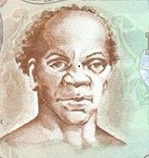Sharpe is widely regarded as the principal leader of the Baptist War, the antislavery uprising by enslaved people that started shortly after Christmas of 1831 in western Jamaica.
He was held as a slave in the parish of St James, where the uprising began. He was part of the enslaved elite – a small group of enslaved people within the complex social hierarchy of Jamaican slave society.
That status gave Sharpe the ability to travel with relative freedom in St James. He was literate, and so better able than most to keep abreast of the transatlantic political debate about the future of slavery at a time when white abolitionists in Britain were stepping up their calls for immediate emancipation.
Sharpe was also a deacon in the Baptist mission church. He and other leaders of the uprising devised a political ideology that combined the teachings of Christianity – like the notion that one could not serve two masters (God and man) – with their own experiences of enslavement in Jamaica. They thereby created a unique version of ‘liberation theology’ that drove their mass protest against slavery.

We do not know what Sharpe looked like, but artists have based their interpretations on a contemporary description of him by the white missionary Henry Bleby, resulting in the images of Sharpe that feature on Jamaican coins and banknotes, as well as in other illustrations, statues and sculptures.
The Baptist mission church also served Sharpe and the other leaders in practical ways: it provided a network of communities and contacts that they used to organise their uprising, which began as a large-scale strike.
It is, of course, those connections with the Baptist mission church that give the Baptist War its name.
Sharpe’s role in such a huge uprising represented a monumental achievement of political inspiration and practical organisation, against great odds.
However, Sharpe and the other leaders lost control of events, as their protest began to splinter and dissolve in the face of white opposition. With the arrival of British troops at Montego Bay in January of 1832, Sharpe and other determined leaders of this signal antislavery protest were pursued and captured.
Sharpe stood trial for his leadership of, and participation in, the uprising. He was executed in Montego Bay on 23 May 1832. A transcription of the record of his trial can be found on this site.
In 1982, Sharpe was posthumously conferred with the Order of the National Hero by the Jamaican government.